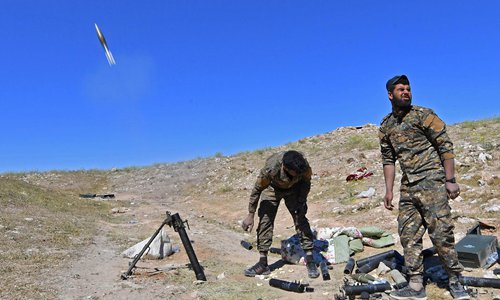Isolated US vetoes UN resolution over jihadists’ fate in Syria and Iraq
Source: AFP Published: 2020/9/1 17:48:42

A fighter with the Syrian Democratic Forces fires a mortar shell toward a part of Baghouz where remaining Islamic State (IS) group fighters are holding out in their last position, in the countryside of the eastern Syrian province of Deir Ezzor on Monday. A shroud of black smoke covered the last redoubt as forces battled holdout jihadists. Photo: AFP
The US' diplomatic isolation grew Monday when it stood alone in the UN Security Council to veto a resolution on the fate of thousands of foreign jihadists being held in Syria and Iraq.The other 14 members of the Security Council supported the Indonesia-drafted resolution that encouraged countries to prosecute, rehabilitate and then reintegrate into society their nationals who had enlisted in foreign "terrorist" causes.
But the US refused to back the resolution because it did not demand countries actively repatriate foreign fighters who traveled to the Middle East to join Al Qaeda and the Islamic State Group.
The US veto highlighted the growing divide between Washington and its European allies, as well as Arab countries, who have refused to commit to taking back foreign fighters since allied forces crushed the Islamic State over a year ago.
Thousands of foreign fighters and their families remain in prison camps in Syria and Iraq as countries resist taking them back.
Washington, whose insistence on including the word "repatriation" in the text was originally backed by Moscow, has long pressed the idea of repatriating foreign fighters detained in Syria and Iraq.
Some European countries, including France and Belgium, have adopted a case-by-case approach to repatriating the children or even wives of jihadist fighters held in the Middle East. And the aim of the Indonesian text was to encourage actions that would combat recidivism among those who joined extremists.
But mostly the other countries have preferred that their nationals stand trial and face punishment in the countries where their crimes were committed, putting the onus mainly on Iraq to deal with them.
"The Indonesian resolution before us, supposedly designed to reinforce international action on counterterrorism, was worse than no resolution at all," said US UN Ambassador Kelly Craft.
But another diplomat, insisting on anonymity, said the use of the veto had "become very cheap," adding that it was "very damaging" to cross-Atlantic relations.
AFP